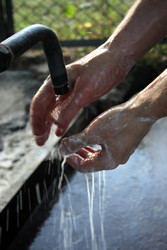Water and sanitation access for all through better policy making
Key recommendations to eradicate structural inequality in water and sanitation have been published in a new European Commission brochure, which highlights important developments in EU-funded social science research. The recommendations come from the EU-funded DESAFIO (Democratisation of Water and Sanitation Governance by Means of Socio-Technical Innovation) project. DESAFIO was launched in 2013 in order to find new ways of ensuring access to water and sanitation services, arguably one of the major challenges facing Brazil and other Latin American and Caribbean countries. DESAFIO is a fitting title for the project, as the word means ‘challenge’ in both Portuguese and Spanish. Many people live without adequate access to water and sanitation services. This presents a health risk and can have a significant detrimental effect on an individual’s quality of life. Often the obstacles to providing adequate services are not simply technical problems but are rather based on economic and policy processes that urgently need to be addressed. The project began by examining socio-technical innovations that might help to eradicate structural inequality in water and sanitation. Project partners from Europe and Latin America examined how such innovations might lead to changes in public policy and achieve sustainable results. The project also looked at the conditions and processes that can hamper equal access to sanitation. From the beginning, researchers engaged with beneficiary communities, practitioners and local authorities in order to design and implement innovations. A total of ten case studies were monitored. These included innovations to supply safe water to small rural communities in Colombia and Brazil and the provision of sewerage in Brazilian favelas located at the heart of large metropolitan areas. Some cases received strong public-sector intervention while others relied more on local communities for management and operation. Results from these case studies, which have since been published in the Commission’s brochure, suggest that a break from technology-centred, top-down solutions could be highly beneficial. Policies that privilege private profit over public benefits – such as the privatisation of water and sanitation services – should be avoided. Instead, innovations that strengthen the ability of public authorities to deliver and regulate safe access should be pursued, while investment should be targeted at providing long-term infrastructure maintenance and management. Ultimately, say the researchers, this means prioritising long-term social returns in public health and quality of life over short-term economic gains. Inter-sectoral cooperation should be supported, and innovations promoting the active and meaningful involvement of local communities and other relevant actors – especially the poor and most vulnerable – should be pursued. Such policies would help to deepen the substantive democratisation of government and encourage the management of and access to water and sanitation services through social participation. The main conclusion of DESAFIO, which was officially completed at the end of July 2015, is that in order to achieve the development goals that have been set by the international community for eradicating poverty, innovative new socio-technical solutions for providing safe access to water and sanitation must be identified and implemented. For further information please visit: DESAFIO http://desafioglobal.org/
Countries
United Kingdom



